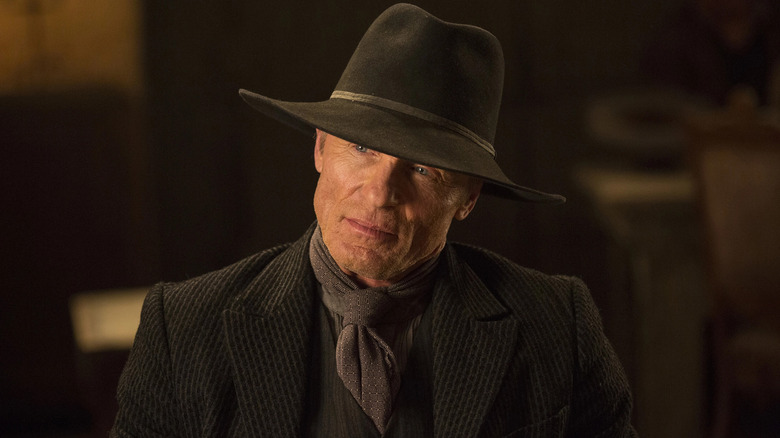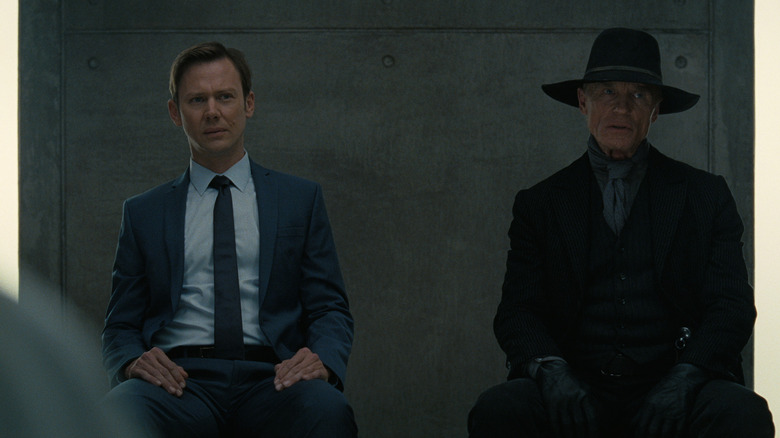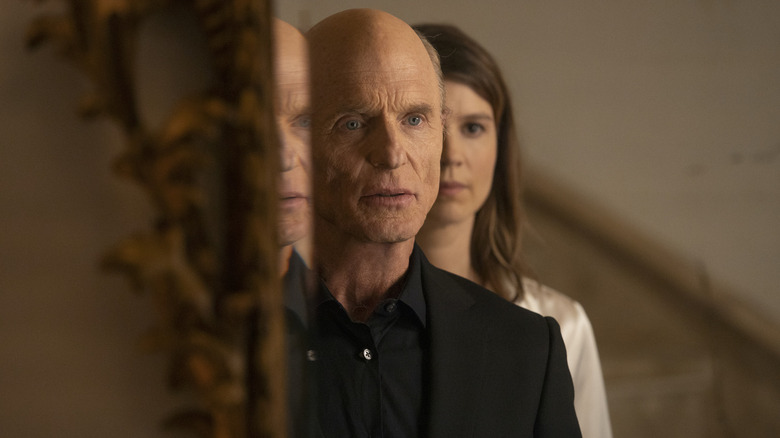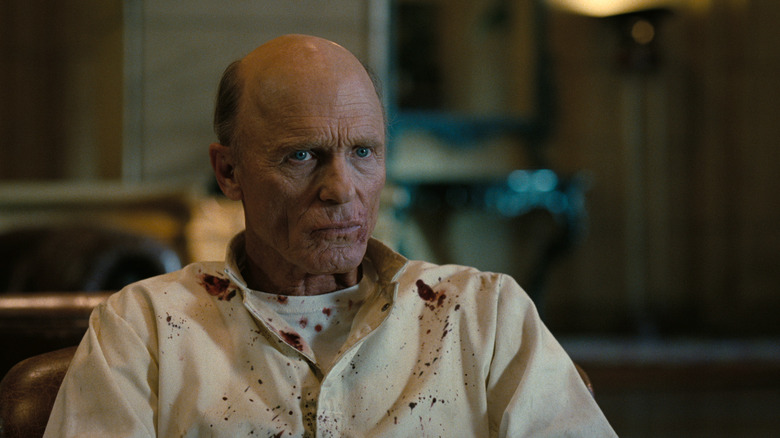Westworld's Man In Black Is The Show's Morally Compromised Core
Though each season of the HBO series "Westworld" is wildly different from the last, they all share common themes and a universal understanding of reality that is more than a little nihilistic.The series is loosely based on the film of the same name directed by Michael Crichton (yes, the same guy that wrote "Jurassic Park"), and like most of his work, it doesn't depict humans very kindly. The series takes place in a near-future where androids have become sentient, and their mechanics are so complex that they're nearly indistinguishable from humans. Instead of worrying about the possible moral implications, people decide to capitalize on the technology and create a theme park where the filthy rich can live our their wildest and most depraved dreams. Part of that theme park is Westworld, a land set in the old west complete with cowboys, fights with Indigenous tribes, a saloon, and all of the trappings of a John Ford or Sergio Leone movie. Westworld and the other Delos parks are the ultimate in alternate reality, because they are as close to real as anyone can get. Of course, the android "hosts" eventually wake up and rebel, setting off a chain of events that could end all of humanity.
While there aren't very many true heroes in this complicated series, most of the villains tend to be human, and there's none among them worse than the Man in Black, played by Ed Harris. His identity was a major mystery in the first season, and by season 2, he had proven himself to be a monster when he murdered his only child in cold blood. That moment would change him forever and send him over the edge, cementing the series' assessment of humanity as ultimately beyond redemption.
William vs. The Man in Black
The Man in Black's identity was revealed in a shocking twist at the end of season 1, when the relatively mild-mannered and sweet-hearted William (Jimmi Simpson) turned out to have become the Man in Black as he aged. The first season deals with morality in very binary, computer hacker-inspired terms, with visitors deciding upon entering the park whether they want to be a "white hat" or a "black hat," symbolically representing good and evil through haberdashery. William spends almost all of season 1 wearing a white hat and tries his best to do the morally right thing even when the opposite is easier or even encouraged. He falls in love with one of the hosts, a farmer's daughter named Dolores Abernathy (Evan Rachel Wood), and that love makes him desperate to find a way to break her free. He becomes obsessed with the park and its creators, Robert Ford (Anthony Hopkins) and Arnold Weber (Jeffrey Wright), trying to unravel the mysteries embedded in the park's "narrative" by the two men.
More than anything, William wants the game to become real. He wants Dolores' love for him to be real, not programmed. He wants to actually be in danger in the park, not just pretending and safe because of Delos protocols. Because he is so wrapped up in the narrative, he starts to forget about his real-world concerns, like his wife and daughter. They become background noise to his focus on unraveling the mysteries and "winning the game" in the only way he knows how.
To achieve this goal, he's willing to do a number of horrible things to all of the hosts as the Man in Black. His talent for violence is first revealed when part of the narrative involves Dolores being kidnapped by Confederate soldiers and he brutally dispatches all of them. It's only the first hint at what he's capable of, but by the time he goes fully black-hat, William is a monster to humans and hosts alike, and his most disturbing victim is his daughter, Emily (Katja Herbers).
Creating life and taking it away
The unusual nature of the hosts' sentience makes their suffering seem less horrific, at least to many of the people that inhabit the world of "Westworld." People treat them with the same casual disregard someone might have for a toaster or cell phone, not recognizing that they are causing real harm. William's obsession with the park and the damage he causes there begins to seep into his real life when his wife of 30 years dies by suicide. She discovered the things he did in the park and took her own life after hiding an information card for Emily to find, complete with William's entire history in the park.
After Dolores "frees" the hosts and starts a revolution, killing Ford, the Man in Black continues his journey through the park, glad that there are no longer safety measures. Emily tries to talk sense into him, finding him in the wilds of the park, but he's already too far gone. She points out that he's lived in "false realities" for too long, and blames him for her mother's death, but he seems uninterested, telling her that she's only a host planted by Ford to confuse him. She snaps back, "I'm not a host pretending to be a human, Dad. I'm your daughter, pretending to give a s*** about you." Even that isn't enough to convince him that she is truly human, and he kills several Delos soldiers before aiming at her. "Those are real people," she whimpers, realizing that he has finally crossed a line and taken "human" life. She reaches for the card her mother gave her, to prove her identity to him, but he shoots her dead.
The Man in Black then proceeds to mutter to himself as he looks for proof that Emily is a host, another pawn in the massive chess match between himself and Ford, and he discovers that she was his real, flesh-and-blood daughter. He killed her without hesitation in a flash because of his fixation on the park and its mysteries. His focus on the narrative made him forget everything else that had previously mattered, and it made him paranoid, violent, and ultimately delusional. He had just killed other humans, taken lives that couldn't be easily resurrected like the hosts. He had killed his own child.
The series' dark heart
Season 3 allowed the Man in Black to confront his demons through Delos-mandated therapy, having conversations with himself from different points in his past in episode 6, "Decoherence." The whole thing is exceptionally trippy, but it also shows just how much the character has changed over time as he's allowed his obsession with the park to become all-consuming. He crossed plenty of lines of morality before killing Emily, but ending the life of his own daughter was a turning point for the character's total mental collapse. Guilt haunts him from that moment forward, and he even hallucinates seeing Emily during his moments of delusion.
The Man in Black's grip on reality is almost completely gone, and that makes him more deadly than he's ever been. He ends up battling it out with one of the hosts who has been given his memories and he loses, which means audiences may have seen the end of the human version of the Man in Black. But if "Westworld" has taught us anything, it's that consciousness and identity is far more complicated than life and death, so he truly lives on, in a way, through the host versions that exist. Immortality is what he always wanted, isn't it?
Obsession is the ultimate sin in "Westworld," whether it's an obsession with wealth like many of the Delos brass, an obsession with power like Ford, an obsession with a mystery like William, or even an obsession with freedom at any cost, like Dolores. In the end, our obsessions are what cause us to act against our own best interests and self-sabotage, no matter how good our intentions may be. After all, to err is human.
Season 4 of "Westworld" premieres June 26, 2022 on HBO and HBO Max.



